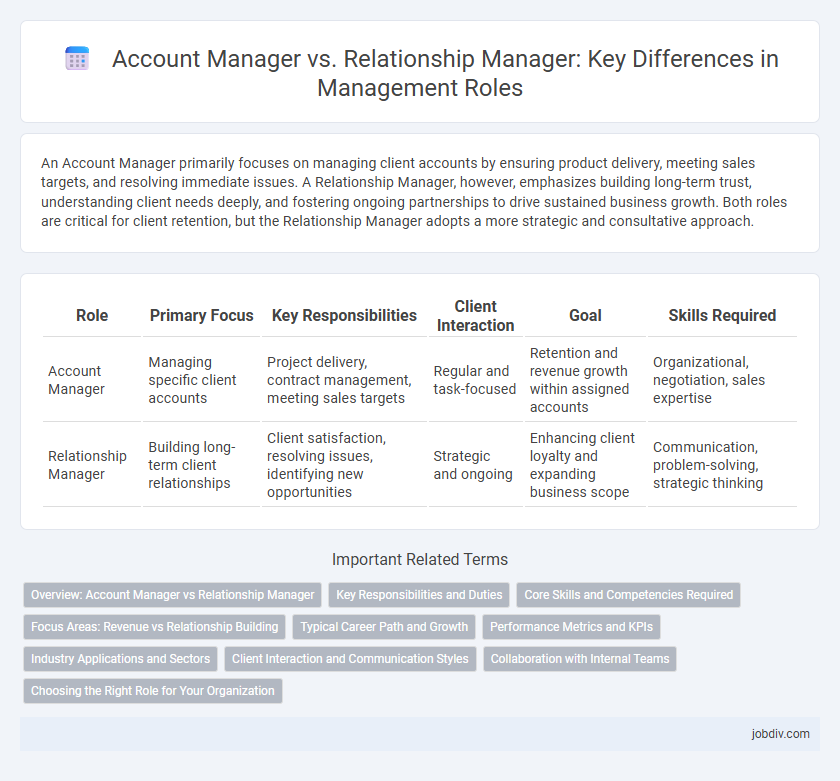An Account Manager primarily focuses on managing client accounts by ensuring product delivery, meeting sales targets, and resolving immediate issues. A Relationship Manager, however, emphasizes building long-term trust, understanding client needs deeply, and fostering ongoing partnerships to drive sustained business growth. Both roles are critical for client retention, but the Relationship Manager adopts a more strategic and consultative approach.
Table of Comparison
| Role | Primary Focus | Key Responsibilities | Client Interaction | Goal | Skills Required |
|---|---|---|---|---|---|
| Account Manager | Managing specific client accounts | Project delivery, contract management, meeting sales targets | Regular and task-focused | Retention and revenue growth within assigned accounts | Organizational, negotiation, sales expertise |
| Relationship Manager | Building long-term client relationships | Client satisfaction, resolving issues, identifying new opportunities | Strategic and ongoing | Enhancing client loyalty and expanding business scope | Communication, problem-solving, strategic thinking |
Overview: Account Manager vs Relationship Manager
An Account Manager focuses on managing client accounts, ensuring project delivery, and meeting sales targets, primarily handling operational and transactional aspects. A Relationship Manager emphasizes cultivating long-term client relationships, understanding client needs deeply, and driving customer loyalty and retention. Both roles aim to maximize client satisfaction but differ in scope: Account Managers are project-focused, while Relationship Managers are client-focused.
Key Responsibilities and Duties
Account Managers oversee client accounts by ensuring project deliverables meet client expectations, managing budgets, and coordinating internal teams to maintain service quality. Relationship Managers focus on building and sustaining long-term client relationships by identifying customer needs, facilitating strategic discussions, and enhancing customer satisfaction and loyalty. Both roles require strong communication skills, but Account Managers emphasize project execution while Relationship Managers prioritize client engagement and retention.
Core Skills and Competencies Required
Account Managers excel in project coordination, client communication, and sales acumen, focusing on meeting specific client account goals and driving revenue growth. Relationship Managers prioritize interpersonal skills, strategic relationship building, and long-term client retention, ensuring sustained collaboration and customer satisfaction. Both roles require problem-solving abilities, market knowledge, and negotiation expertise to effectively manage client expectations and deliver tailored solutions.
Focus Areas: Revenue vs Relationship Building
Account Managers concentrate primarily on revenue generation by managing client accounts, ensuring sales targets are met, and maximizing profitability through upselling and cross-selling opportunities. Relationship Managers emphasize building long-term client relationships, fostering trust, and enhancing customer satisfaction to secure client loyalty and retention. Both roles require strong communication skills but differ fundamentally in their focus on immediate financial results versus sustained client engagement.
Typical Career Path and Growth
Account Managers typically progress from sales or customer service roles, advancing by developing expertise in client portfolio management and upselling strategies. Relationship Managers often begin in client-facing roles within banking or consultancy sectors, growing through skills in strategic partnership building and cross-functional collaboration. Career growth for Account Managers centers on managing larger accounts and leading revenue generation, while Relationship Managers focus on deepening client trust and expanding network influence.
Performance Metrics and KPIs
Account Managers are primarily evaluated on revenue growth, client retention rates, and sales targets achieved, highlighting their focus on transactional performance metrics. Relationship Managers emphasize customer satisfaction scores, Net Promoter Score (NPS), and long-term engagement metrics to measure the strength and quality of client relationships. Both roles utilize Key Performance Indicators (KPIs) like account growth, churn rate, and upsell ratios, but their priorities differ to align with sales execution versus relationship development strategies.
Industry Applications and Sectors
Account Managers typically focus on managing client portfolios within specific industries like technology, finance, and manufacturing, ensuring targeted solutions and product alignment. Relationship Managers often work in sectors such as banking, healthcare, and real estate, emphasizing long-term client engagement, trust-building, and cross-selling tailored financial or service solutions. Both roles require deep industry knowledge, but Account Managers prioritize transactional account growth while Relationship Managers cultivate holistic client partnerships.
Client Interaction and Communication Styles
Account Managers prioritize transactional client interactions, focusing on meeting specific project goals and delivering results within agreed timelines. Relationship Managers emphasize ongoing communication, nurturing long-term partnerships through personalized engagement and proactive problem-solving. Both roles require strong interpersonal skills, but Relationship Managers typically adopt a consultative approach to build trust and loyalty over time.
Collaboration with Internal Teams
Account Managers coordinate closely with sales, marketing, and product teams to ensure client needs are met and deliverables are aligned with business objectives. Relationship Managers engage cross-functional departments such as customer service, finance, and legal to maintain long-term client satisfaction and address issues proactively. Both roles prioritize internal collaboration to enhance client experience and drive strategic growth.
Choosing the Right Role for Your Organization
Selecting between an Account Manager and a Relationship Manager depends on your organization's strategic goals; Account Managers typically focus on transactional sales and client deliverables, driving revenue through specific product or service management. Relationship Managers prioritize long-term client engagement and trust-building, enhancing customer loyalty and retention through personalized communication and problem-solving. Understanding the distinct roles helps align team strengths with business objectives to maximize client satisfaction and profitability.
Account Manager vs Relationship Manager Infographic

 jobdiv.com
jobdiv.com